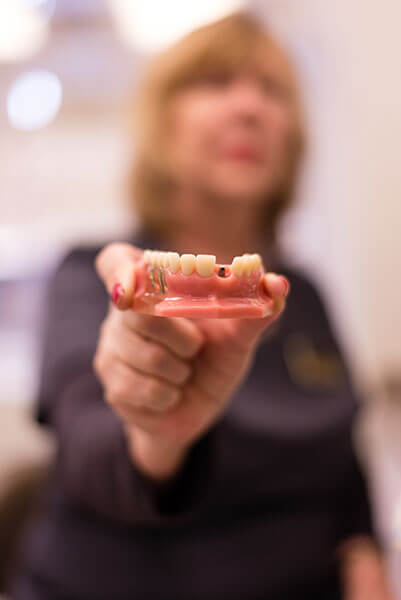Implant Rescue
Antibacterial irrigation is essential to implant health.
Although dental implants have a very high rate of success, as with all things in life – things can go wrong. If problems happen to you, acting fast will improve your chances of successfully treating and saving your dental implant. Regardless of who placed or restored your dental implant, we are happy to help.
Learn More
Are you experiencing any of these symptoms or problems with your implant?
- Biting on the implant site feels uncomfortable.
- Swelling or redness around the implant.
- A discharge or pus coming from or near the implant site.
- Discomfort around the implant site.
- An unpleasant smell or taste in your mouth.
- Gum recession around the implant.
- A dark colour seen through the gums at the implant site.
- Difficulty cleaning around the implant.
It is important to understand that infection and bone loss can occur around the implant even without any pain or discomfort. If you have any concerns, you should have your dental implant evaluated as soon as possible.
Peri-implantitis
Dental implants, like natural teeth, are at risk of becoming infected from a whole range of bacteria that reside within the oral cavity. These infections can cause a serious and potentially devastating form of gum disease known as Peri-Implantitis. Peri-Implantitis is the loss of bone around the implant due to infection. This type of infection can progress slowly or quickly. Early intervention and therapy can often be successful, saving your implant. However, ignoring or being unaware of the early signs and symptoms of this disease, such as bleeding, swelling, or pain, can result in considerable consequences and expense, which can ultimately lead to the loss of your dental implant.
We have both the knowledge and skills to help return your dental implant to optimal function and health. Dr. Caudry has spent many years focusing on the treatment of gums issues that can afflict dental implants, and has lectured on the subject around the world.
Our mission is to achieve the most excellent function and aesthetic outcome of your dental implant. Regular maintenance appointments are essential to prevent future dental implant complications. Dr Caudry's experience and technical excellence will ensure your dental implant complications can be addressed and expertly treated.

Frequently Asked Questions — Peri-implantitis
What is peri-implantitis?
Peri-Implantitis is a bacterial infection affecting the gums and bone surrounding an implant. It is associated with the loss of supporting bone, bleeding and suppuration (pus). If left untreated, Peri-Implantitis could lead to the eventual loss of the implant.
What causes Peri-Implantitis?
Peri-Implantitis is caused by any condition that promotes bacterial infection around the implant. These include a patient’s medical condition, not adhering to ongoing maintenance, a lack of adequate oral hygiene, as well as the treatment protocol related to the implant and crown.
What are the risk factors associated with Peri-Implantitis?
Any factors that increase bacteria growth will increase the risks of Peri-Implantitis.
Major risk factors include:
- Poor oral hygiene
- Smoking
- Untreated Periodontitis
- Poorly controlled diabetes
- Non-compliance with prescribed hygiene maintenance program
How is Peri-Implantitis diagnosed?
- Patient symptoms may include: pain, mobility of the implant, and a bad taste. It is important to note that in most cases there may be no symptoms noticed.
- Signs observed by your dentist or hygienist include: suppuration (pus), bleeding, progressive bone loss, and increasing probing depths.
How is Peri-Implantitis treated?
Surgical treatment is used to reverse bone loss by either:
- Disinfecting and re-preparing the surface of the implant
Disinfecting and re-preparing the surface of the implant with bone regeneration.
What are the consequences if Peri-Implantitis is not treated?
If left untreated, the infecting bacteria will multiply, leading to persistent bone degradation. This may cause pain, a bad taste, the eventual loss of the implant, and possibly the loss of adjacent teeth. The extent of bone loss may also compromise your options for another implant.
It is best to be in a practice that specializes in monitoring for early signs of Peri-Implantitis. As with most infections, it is best to identify and treat the problems as soon as possible.
How is Peri-Implantitis prevented?
One of the most successful methods for cleaning dental implants is the use of antibacterial irrigation as a part of your maintenance program. We offer this service for any implant, including those not placed in our practice by Dr. Caudry. In hand with proper oral hygiene and adhering to your regular maintenance program, these treatments are integral to preventing any destructive bacterial infection in your mouth. A healthy implant is as important to us as a healthy mouth.
Contact Us
Our front office team will assist with scheduling your appointments, and processing dental insurance claims. We will answer all your question and concerns before any treatment begins. We strive to ensure our patients receive the most conservative treatment plan that will lead to the best treatment outcome. You do not need a referral to have a consultation.
Global Speaking Engagements and the Caudry Education Centre
Over the past 20 years Dr. Caudry has travelled the world imparting her knowledge, research, and technical skills to other Dental professionals.
Today Dr. Caudry carries on the tradition of using her exceptionally high level of education and surgical skills to the benefit of her patients while sharing those skills and experiences with her colleagues so they too can provide her knowledge and techniques to their patients.
Learn More
